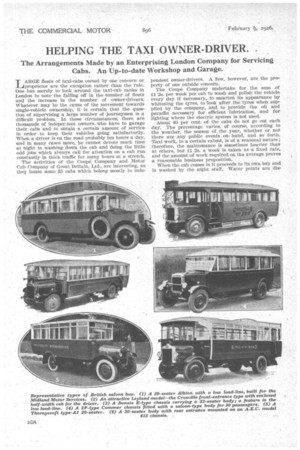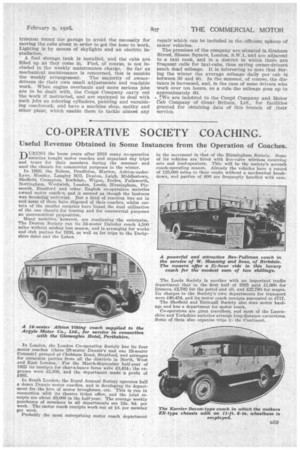HELPING THE TAXI OWNER-DRIVER.
Page 42

Page 43

If you've noticed an error in this article please click here to report it so we can fix it.
The Arrangements Made by an Enterprising London Company for Servicing Gabs. An Up-to-date Workshop and Garage.
T1ARGE fleets of taxi-cabs owned by one concern or J proprietor are the exception rather than the rule. One has merely to look around the tai-cab ranks in London to notethe falling off in the number of fleets and the increase in the number of owner-drivers. Whatever may be the cause of the movement towards single-vehicle ownership, it is. certain that the question of supervising a large 'number of journeymen is a difficult problem. In these circumstances; there are thousands of independent owners who have to garage their cabs and to obtain a certain amount of service in order to keep their vehicles going satisfactorily. When a driver is on the road probably ten hours a day, and in many cases more, he cannot devote much time at night to washing down the cab and doing the little odd jobs which always call for attention on a cab run constantly in thick traffic for ninny hours at a stretch.
The -activities of the Coupe Company and Motor Cab Company of Great Britain, Ltd., are interesting, as they house some. 35 cabs, which belong mostly to inde. pendent owner-drivers. A few, however, are the property of one outside concern.
The Coupe Company undertake for the sum of £1 2s. per week per cab to wash and polish the vehicle every day if necessary, to smarten its appearance by whitening the tyres, to 'look atter the tyres when supplied by the company, and to provide the oil and paraffin necessary for efficient lubrication, and for lighting where the electric system is not used.
About 40 per cent. Iof the cabs do not go out each day. The percentage varies, Of course, according to, the weather, the season of the year, whether or not. there are any public events on hand, and, so forth. Taxi work, to a certain extent, is of a' seasonal nature; therefore, the maintenance. is sometimes heavier than at others, but £1 2s. a week is taken -as a fixed rate, and the amount of work required on the average proves a reasonable business proposition.
When the cab comes in it proceeds to its own by and is washed by the night staff. Water points are dis
tributedround the garage to avoid the necessity for moving the cabs about in order to get the hose to work. Lighting is by means of skylights and an electric installation.
• A fuel storage tank is installed, and the cabs are filled up as they come in. Fuel, of course, is not included in the weekly maintenance charge. So far as mechanical maintenance is concerned, this is outside the weekly arrangement. The majority of ownerdrivers do their own small adjustments and roadside work. When engine overhauls and more serious jobs are to be dealt with, the Coupe Company carry out the work if instructed, and are equipped to deal with such jobs as reboring cylinders, painting and varnishing coachwork, and have a machine shop, smithy and other plant, which enable them to tackle almost any repair which can be included in thefefficient upkeep of motor vehicles.
The premises of the company are situated in Graham Street, Sloane Square, London, and are adjacent to a taxi rank, and in a district in which there are frequent calls for taxi-cabs, thus saving owner-drivers much dead mileage. It is interesting to note that during the winter the average mileage daily per cab is between 30 and 40. In the summer, of course, the distance is increased, and, in the case of some drivers who work over ten hours, as a rule the mileage goes up to approximately 60. A We are indebted to the Coupe Company and Motor Cab Company of Great Britain, Ltd., for facilities granted for obtaining data of this branch of their service.


























































